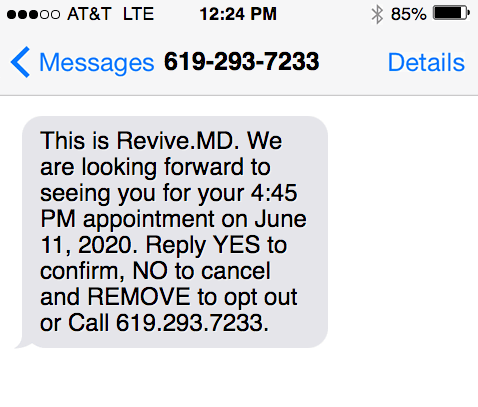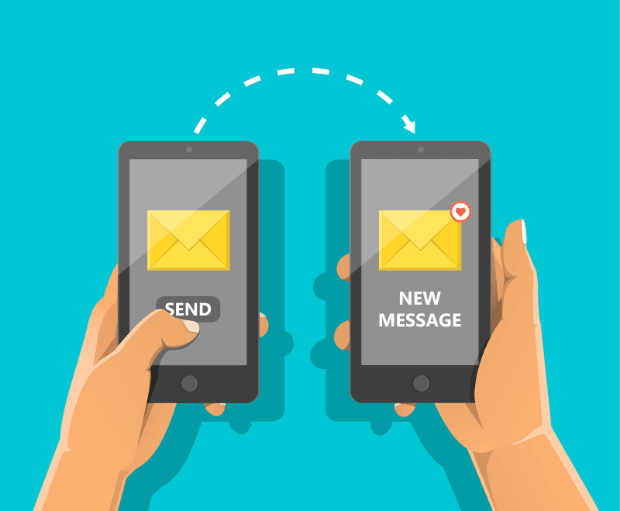Text Message Marketing (aka, SMS marketing) can be a great avenue for businesses to improve communications and marketing with customers. According to Salesforce, the use of SMS marketing grew by 197% in B2B communications between 2015 and 2017.
Proving to be not as saturated as other marketing channels, SMS marketing is becoming increasingly used in B2B and B2C campaigns. Most businesses are now realizing that SMS marketing has created a new approach to reaching and communicating with customers.
The opportunity in utilizing text messaging for businesses can often range from increasing product awareness, improving customer engagement, and generating leads. In reality, there are enormous reasons why businesses today should employ SMS in their overall marketing plan. Here are just a few of them:
1. Fast and efficient delivery
 SMS marketing, especially in the context of mobile marketing has proven to be one of the fastest ways for businesses to reach customers. SMS are delivered instantly and they come with a variety of customization options. Businesses can send time-sensitive messages like flash sales and event-related promotions, and immediately reach thousands of users to respond to business offers.
SMS marketing, especially in the context of mobile marketing has proven to be one of the fastest ways for businesses to reach customers. SMS are delivered instantly and they come with a variety of customization options. Businesses can send time-sensitive messages like flash sales and event-related promotions, and immediately reach thousands of users to respond to business offers.
Due to the fact that mobile phones have become very integral to today’s users’ lifestyle, there are more chances that business communications and marketing campaigns sent via SMS will get seen as soon as they are delivered.
2. Higher open rates
According to OptinMonster, 90% of SMS messages are read within the first 3 minutes. Unlike an email message where the user has to open their email app to check their inbox, SMS offers more accessibility with lesser friction in terms of readability and engagement.
With many emails increasingly getting filtered by spambots, and customers needing to sift through several emails from competing brands, SMS marketing offers a new lease of life, where messages are put right in the face of customers.
Most phones today display a snippet of text messages right on the screen, which makes SMS more personal and enables brands to stand out from other notifications, thus, resulting in a higher open rate than any other marketing channels.
Compared to email marketing which is opened less than 20% of the time, SMS marketing, according to CampaignMonitor, was found to have open rates as high as 97%. Due to the fact that SMS messages are less likely to be screened by a spam filter, many businesses are confident that their SMS campaigns will reach their intended audience without any interruption.
3. Higher engagement rates
 It is well established that SMS do not only get opened more frequently, but they also have higher response rates too. The average engagement rate for SMS messages stands at a respectable 45% and could go even higher up to 90%. This proves that SMS is an effective marketing channel for businesses since it often improves the chances of conversion.
It is well established that SMS do not only get opened more frequently, but they also have higher response rates too. The average engagement rate for SMS messages stands at a respectable 45% and could go even higher up to 90%. This proves that SMS is an effective marketing channel for businesses since it often improves the chances of conversion.
For today’s customers, receiving text messages is their preferred way of communicating with family and friends, which makes texting more integral in their communication. A survey by VoiceSage shows that 70% of customers accept SMS as a good avenue for businesses to get their attention.
By communicating with customers the way they want you to, businesses are increasingly seeing more engagement and getting more positive reactions from customers.
Emails could sit unread for days, phone calls can go unanswered, but text messages are almost always read immediately after they’re delivered. With the average CTR for PPC ads even worse at 2%, the likelihood for businesses to get their message to the intended target is vastly higher with SMS than with email, PPC, or social media.
4. Faster response time
 According to GSMA, it takes users 90 seconds to respond to a text message. While customers have shown the habit of quickly responding to SMS, the same cannot be said with other communication channels such as email. Half of the time, they take up to an hour and a half to respond to an email having the same information and communication style.
According to GSMA, it takes users 90 seconds to respond to a text message. While customers have shown the habit of quickly responding to SMS, the same cannot be said with other communication channels such as email. Half of the time, they take up to an hour and a half to respond to an email having the same information and communication style.
This makes SMS text messaging a key marketing channel for time-sensitive, participation-heavy offers, such as contests, limited-time discounts, or event registration. This means that businesses can utilize the speed of SMS marketing to get real-time customer feedback on orders as well as encourage faster 2-way communication.
5. Popular messaging platform with a larger reach
Even in the midst of technology innovations, SMS still remains the most used messaging platform today. About 90% of mobile users engage in one form of text messaging at least once a day, including those who have other messaging apps installed on their phones. Even more insightful is that SMS is also particularly useful in reaching slightly older demographics.
According to the Ericsson Mobility Report, about 3.6 billion mobile devices are “not smart.” This shows that nearly 50% of the world’s mobile devices cannot be reached through intuitive advertising through or alternative messaging applications. SMS messaging, therefore, represents a direct method, and one of the only ways, to reach these consumers through their devices.
With the number of mobile phone users has nearly tripled over the past decade, to over 5 billion as of 2018, this proves that SMS marketing can be effective for targeting and reaching a large number of that user base.
More so, many businesses today are now turning to SMS as their desired choice of mobile marketing. For example, Coca-Cola now spends about 70% of its mobile marketing budget on SMS services. The large reach and effectiveness of these marketing campaigns among diverse target audiences suggest that the effectiveness of SMS marketing is likely to continue to grow.
6. Influential to other communication channels
 Apart from proving to be an effective avenue for marketing campaigns, SMS can also have an impact on other business communication Channels. SMS marketing has shown to help increase user interaction with other channels such as email, website, and in-store visits.
Apart from proving to be an effective avenue for marketing campaigns, SMS can also have an impact on other business communication Channels. SMS marketing has shown to help increase user interaction with other channels such as email, website, and in-store visits.
Due to the flexibility of texting, businesses can drive the use of their other channels, using call-to-action such as shortened hyperlinks and action texts. A simple SMS reminder saying, “check the website now for hourly discounts” or “use this coupon now for any purchase” can drive website visits and product purchases.
Brands can also capture email addresses and other customer information using SMS. It is not out of scope for businesses to capture zip codes, survey data, product preferences, receipt numbers, and more using simple interactive SMS.
This is because SMS marketing sets marketers up for other advanced marketing opportunities. companies that embrace SMS marketing quickly see the effectiveness of SMS messaging tactics and understand the receptiveness of their audience to the medium, thereby informing their all-round marketing strategy. In the same vein, text campaigns also set consumers up to recognize a brand’s other marketing campaigns, which helps in improving interaction and brand exposure.
7. Extremely easy to set up and manage
Businesses setting up their first SMS campaign are often surprised how easy it is to set up and implement. The initial perception that SMS campaigns are complex and challenging to set up is derived from the email marketing world were setting up a campaign for the first time involves a lot of configurations, template building, branding and graphics uploading, etc.
With only 160 characters required to work within an SMS marketing campaign, more emphasis is placed on crafting a compelling message for the customer rather than building an interface. This means that setting up the SMS software and sending the text messages takes considerably less time than most people anticipate.
Apart from being easy to set up and manage, SMS marketing is also cost-effective. Most SMS software applications are operated with a SaaS model where businesses only have to pay for SMS campaigns completed, with no cost for system maintenance and other complexities.



